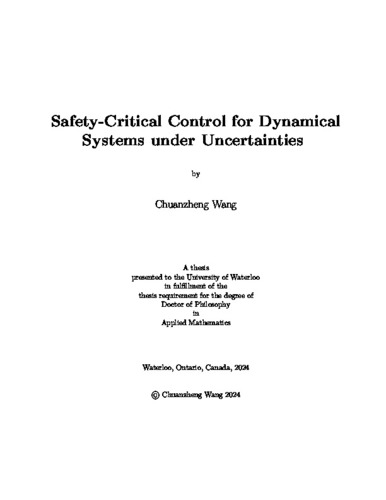| dc.contributor.author | Wang, Chuanzheng | |
| dc.date.accessioned | 2024-02-15 20:24:28 (GMT) | |
| dc.date.available | 2024-02-15 20:24:28 (GMT) | |
| dc.date.issued | 2024-02-15 | |
| dc.date.submitted | 2024-02-06 | |
| dc.identifier.uri | http://hdl.handle.net/10012/20345 | |
| dc.description.abstract | Control barrier functions (CBFs) and higher-order control barrier functions (HOCBFs) have shown great success in addressing control problems with safety guarantees. These methods usually find the next safe control input by solving an online quadratic programming problem. However, model uncertainty is a big challenge in synthesizing controllers. This may lead to the generation of unsafe control actions, resulting in severe consequences. In this thesis, we discuss safety-critical control problems for systems with different levels of uncertainties. We first study systems modeled by stochastic differential equations (SDEs) driven by Brownian motion. We propose a notion of stochastic control barrier functions (SCBFs) and show that SCBFs can significantly reduce the control efforts, especially in the presence of noise, and can provide a reasonable worst-case safety probability. Based on this less conservative probabilistic estimation for the proposed notion of SCBFs, we further extend the results to handle higher relative degree safety constraints using higher-order SCBFs. We demonstrate that the proposed SCBFs achieve good trade-offs of performance and control efforts, both through theoretical analysis and numerical simulations.
Next, we discuss deterministic systems with imperfect information. We focus on higher relative degree safety constraints and HOCBFs to develop a learning framework to deal with such uncertainty. The proposed method learns the derivatives of a HOCBF and we show that for each order, the derivative of the HOCBF can be separated into the nominal derivative of the HOCBF and some remainders. This implies that we can use a neural network to learn the remainders so that we can approximate the real residual dynamics of the HOCBF. Next, we study stochastic systems with unknown diffusion terms. We propose a data-driven method to handle the case where we cannot calculate the generator of the stochastic barrier functions. We provide guarantees that the data-driven method can approximate the It\^{o} derivative of the stochastic control barrier function (SCBF) under partially unknown dynamics using the universal approximation theorem.
Finally, we study completely unknown stochastic systems. We extend our assumption into the case where we do not know either the drift or the diffusion term of SDEs. We employ Bayesian inference as a data-driven approach to approximate the system. To be more specific, we utilize Bayesian linear regression along with the central limit theorem to estimate the drift term. Additionally, we employ Bayesian inference to approximate the diffusion term. We also validate our theoretical results using numerical examples in each chapter. | en |
| dc.language.iso | en | en |
| dc.publisher | University of Waterloo | en |
| dc.subject | dynamical system and control | en |
| dc.subject | safety-critical control | en |
| dc.subject | stochastic system | en |
| dc.title | Safety-Critical Control for Dynamical Systems under Uncertainties | en |
| dc.type | Doctoral Thesis | en |
| dc.pending | false | |
| uws-etd.degree.department | Applied Mathematics | en |
| uws-etd.degree.discipline | Applied Mathematics | en |
| uws-etd.degree.grantor | University of Waterloo | en |
| uws-etd.degree | Doctor of Philosophy | en |
| uws-etd.embargo.terms | 0 | en |
| uws.contributor.advisor | Liu, Jun | |
| uws.contributor.advisor | Smith, Stephen | |
| uws.contributor.affiliation1 | Faculty of Mathematics | en |
| uws.published.city | Waterloo | en |
| uws.published.country | Canada | en |
| uws.published.province | Ontario | en |
| uws.typeOfResource | Text | en |
| uws.peerReviewStatus | Unreviewed | en |
| uws.scholarLevel | Graduate | en |

